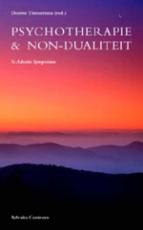Advaita Post Volume 13 No. 16 - Even if there is only a tiny bit...
(September 10, 2012)
--- Even if there is only a tiny bit of limited self-being left behind, this ensures that the ignorance and suffering continues ---
The mirror is always there: reflexive consciousness
[Quinten Metsys: The money changer and his wife, 1514. Louvre]
*****
You know what it is:
you relax into yourself.
Then why do you still make it so difficult?
*****
Text Satsang
The whole existence
From an Advaita talk with Douwe Tiemersma, Gouda, November 9, 2009
It should become increasingly clear that your awakening concerns the whole of your existence. When you sit looking at everything from a particular location, there is a blind spot. You have something behind you that you're not aware of and which plays a role in your manner of seeing. You have identified yourself with that. It's your preprogrammed set of assumptions. This applies not only to seeing, but to all your activities, all your current foci in the world. Through this programming you sit in a very limited situation in which you feel boundaries, in which desires and suffering exist. When you become aware of this structure of not-knowing, it's clear that your whole being will have to open up if there is to be an end to that suffering. So that whole existence will need to completely enter into consciousness. You don't need to know about all kinds of little facts there. Fundamentally, everything will need to enter into that aware sphere as one whole. If you were to speak in temporal terms: from the beginning to the end. In spatial terms: the entire cosmos of your existence. If you are situated in a particular position you can have an expanded awareness at best, but there's always something in the background of which you remain unaware. Again: the whole structure will need to be brought into awareness.
What about yourself as consciousness? Your being-awareness can have different degrees of purity. When it's pure, there's a "self-being" in quotation marks, a "consciousness" in quotation marks, that isn't dependent on the existence-cosmos. You can't say anything about it, so every word is already too much. But clearly there is a knowledge of the existence-cosmos as one whole. There is a sense of the spatial limits and of the beginning and the end in time, so the relativity of it. You know what it means for such a cosmos to begin. Therefore, you have a sense of that which precedes it. You can stay in that knowledge, even though you can't say anything more about it. It has nothing to do with a person, it has nothing to do with forms, it has nothing to do with time and space. In that knowledge it becomes clear how it is with relation to existence in time and space, with consciousness in time and space, with that 'I', that self-being, in time and space. It has nothing to do with space, so it also has nothing to do with a position. What does it mean to stay in that situation in which there's still no existence? What does it mean when the first step into existence occurs? Is it clear what I am referring to?
I actually don't understand anything about this timelessness.
Do you think that it's understandable? Understanding takes place in time. Mental comprehension uses forms from space and time, causality, and all kinds of concepts. The ordinary knowing can't do anything with an indication toward that which precedes it. But clearly there is a knowledge of it. It's very subtle and because it has no form, you can't grasp it. Also in that sphere there isn't anybody who would be able to grasp anything.
If you have just a little bit of a sense of it now, you can stay there with it. You'll just need to let go of all that "wanting to understand". We have often spoken about the acceptance of your own being-experience, for example physically: you can feel very clearly that you are incredibly large, that actually you are the whole cosmos. If you remain on the level of thought you can't go along with that. But if you go along more with your feeling sense and begin taking a look at your own experience then there are very clear things to affirm. In that affirmation you will need to let go of your own mental system. I often refer to the deep dreamless sleep. You go soundly off to sleep. Where do you go? To an infinite sphere beyond space and time. There you have a sense of it. Stay there with it. If you keep thinking, then you can't sleep. Then the wheels keep turning.
Is there ultimately no mental notion any longer of 'I am'?
No, it goes further. When you become aware of 'I am' there is already a quality and actually also already instantly a cosmos, namely the cosmos of 'I am'. It's the first quality of being-consciousness, long before mental consciousness.
Then 'I am' isn't primary.
No, exactly, it's about that which precedes it. There's nothing to say about that, and yet you have knowledge of it. Stay with that knowledge. It's something very simple, it's a primary sense. So it means that, when something emerges, it arises in its relativity, as a phenomenon. There's nothing that can be said about the absolute, but it has a certain side in which something can surely be known, in which some aspect of knowledge exists, without limiting itself to a particular cosmos. Let's call it the underbelly of the absolute.
Then how could a cosmos still be able to exist there?
When this appears it's clear: the phenomena seem to arise, but they are not different from the absolute; they have no individual status. The phenomena arise and disappear once again. Fundamentally there's no separation, no duality. There's no particular identification with anything special; there is a being free of any condition whatsoever. When this recognition is clear, it can linger. If there is yet another distraction caused by something special in this cosmos, a limited self-being is immediately formed. You can see this happening.
So long as you experience duality but yet are still focused on the sense of what precedes it, it's good for you to focus yourself completely on that. When this focus isn't total, something remains behind which functions like a blind spot. Even if it's only a tiny bit of limited self-being that remains behind, it ensures that the ignorance and it's attendant suffering continue. It can become the basis of entrapment in duality anew.
*****
Er is geen tweeheid
als je ontspannen bent
in zelf-bewustzijn
is dat duidelijk.
Boeken
Douwe schreef en redigeerde gedurende zijn leven boeken. Via onze uitgeverij zijn deze nog verkrijgbaar.



